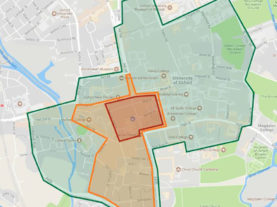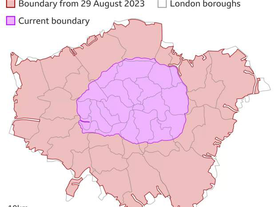The Direct Vision Standard (DVS) and safety permit for heavy goods vehicles (HGVs) requires operators of lorries over 12 tonnes gross vehicle weight to apply and obtain a permit to enter or operate in Greater London, or you may receive a Penalty Charge Notice.
The Direct Vision Standard measures how much an HGV driver can see directly through their cab windows. This indicates the level of risk to vulnerable road users, such as people walking and cycling, near the vehicle. Enforcement of the scheme begins on 1 March 2021.
The Direct Vision Standard and HGV safety permit for HGVs is part of the Mayor of London's Vision Zero plan to eliminate all deaths and serious injuries on London's transport network by 2041.
The following frequently asked questions will give you an overview of the scheme:
When does enforcement begin?
Enforcement of the direct vision standard will start from 1 March 2021.
Where does it operate and what vehicles are affected?
All lorries over 12 tonnes (GVW) entering or operating in Greater London will need to hold a valid HGV safety permit.
The HGV safety permit scheme covers Greater London and will be in operation 24 hours a day, every day of the year.
What do I need to do now?
HGV operators must apply for a permit for their vehicles before travelling through the area. A permit will be granted if the vehicle meets the minimum DVS star rating.
If your vehicle does not meet the minimum DVS star rating, you will need to make your vehicle safer by fitting it with Safe System improvements, or you may receive a PCN.
What you need to know about DVS star ratings and Safe System improvements.
TfL says some logistics operators are reporting that some rented trailers are not fitted with the rear warning signage now required as part of the new HGV safety permit system in greater London. The new rules say that for HGVs over 12 tonnes rated zero stars, all trailers must carry a prominent rear sign warning vulnerable road users of blind spots. Even if TfL has granted a permit to a zero-starred vehicle on the basis of evidence photos of a tractor and trailer in situ with a warning sign, all trailers used with that tractor need signs. TfL enforcement officers are conducting roadside inspections and a number of vehicles have had their HGV safety permits revoked for not having a rear warning sign on the trailer. More information is available on the link above.
Is there a grace period as I can’t get my vehicle booked in for the changes which are needed to ensure compliance?
Tfl have introduced a 90-day grace period to support operators who have ordered Safe System components ahead of the 1 March enforcement start date and are now experiencing delays in supply and fitting.
To benefit from the grace period, please submit evidence from the fitter/garage on branded documentation with details of your appointment and Vehicle Registration Number, before 1 March, to [email protected].
TfL will review the request and send written confirmation of the outcome. Once your Safe System equipment has been fitted, you must follow the DVS Permit Application process.
You must take action before 1 March 2021. Operators informing us of a delay after this date will not be eligible for the grace period.
I'm replacing my non-compliant vehicles with new safer compliant ones but they will be delivered after 1 March, is there a grace period?
Yes, If you can prove that certain non-compliant HGVs are due to be replaced by new vehicles which are on order for delivery during the grace period (ie prior to 29 May 2021) and that the new vehicles will be either rated 1-5 star or, if zero star-rated, booked in for safe system installation before 29 May, then TfL can add the old vehicles to the allow list to avoid PCNs for safety permit violations during that period. The operator must apply for permits for the new vehicles, with photo evidence of safe systems if zero star, and notify TfL to remove the vehicles they are replacing as soon as the new ones come into service.
To add the old vehicles to list, you need to email a statement to this effect to [email protected], attaching a list of:
- The make/model and VRM of each of the old vehicles being replaced
- For each of them, the make/model of vehicle they are being replaced with along with proof or purchase/planned delivery date from a dealer
- VRMs for the new vehicles (if known yet).
What if I take no action?
Once enforcement starts, if you drive an HGV within most of Greater London without a valid permit you may receive a penalty charge notice (PCN) of up to £550 (reduced to £275 if paid within 14 days).
Rental or leasing companies wishing to transfer the PCN to their customers can do so provided they submit to TfL a copy of the vehicle lease/rental or schedule which includes:
- customer name and address
- Vehicle details
- Vehicle on and off hire dates (if applicable)
- Operator licence number
Full details on the operation of the scheme and the permit application process are available on the TfL website.







